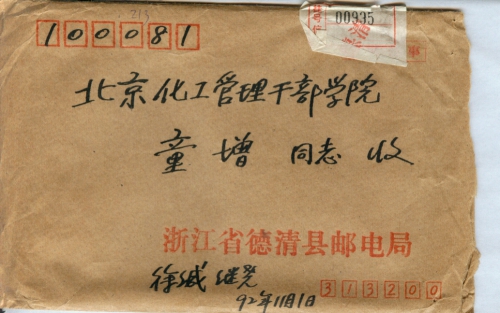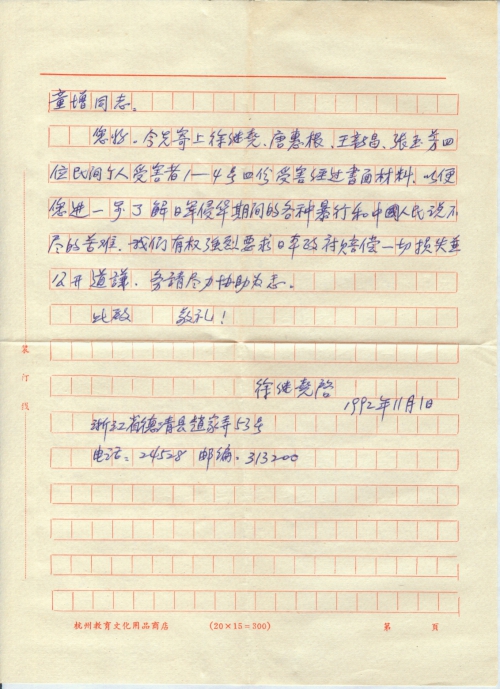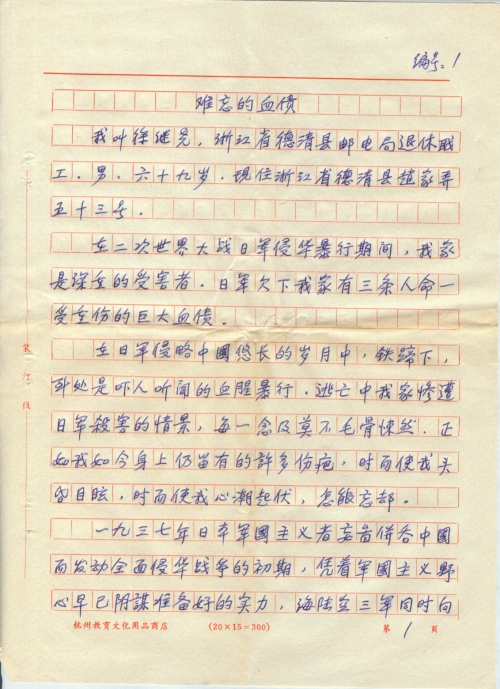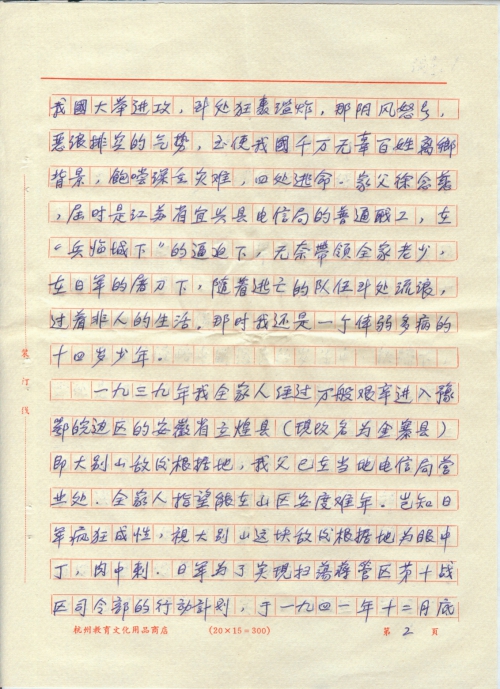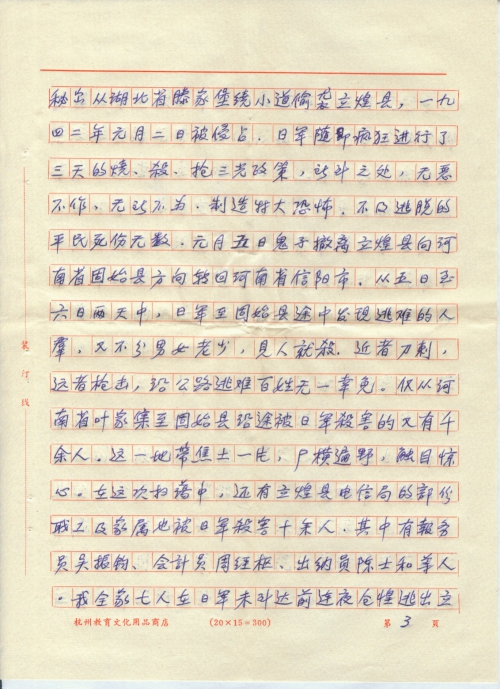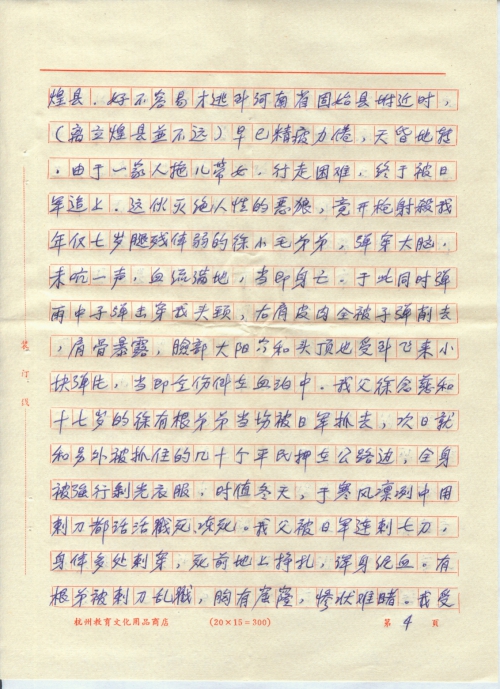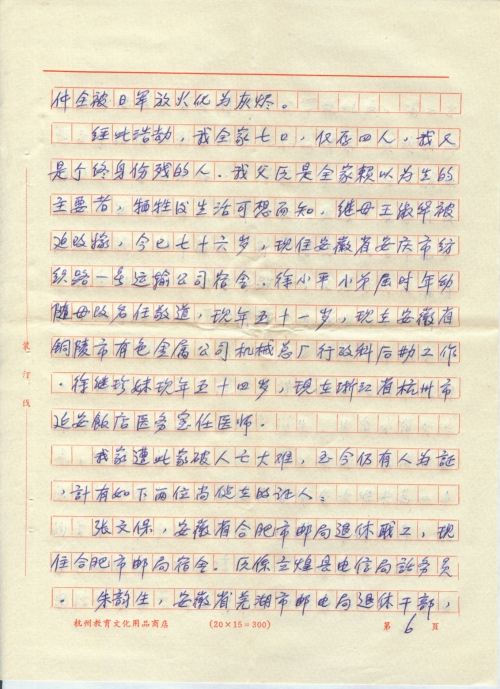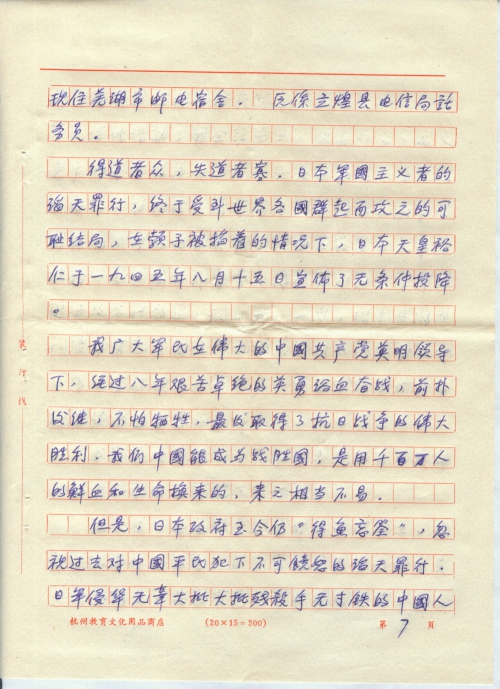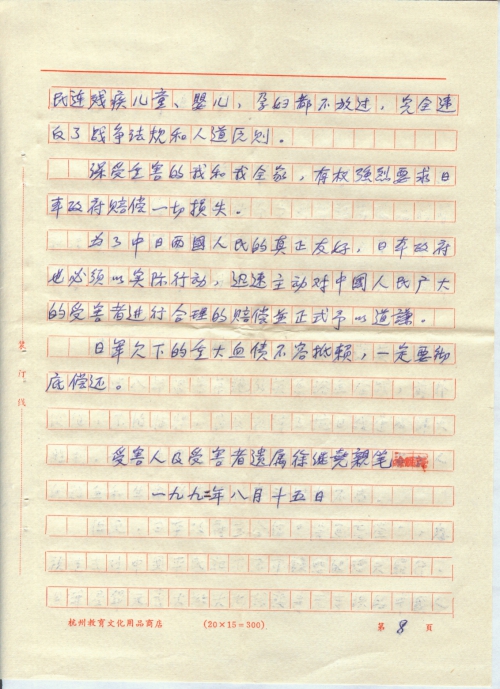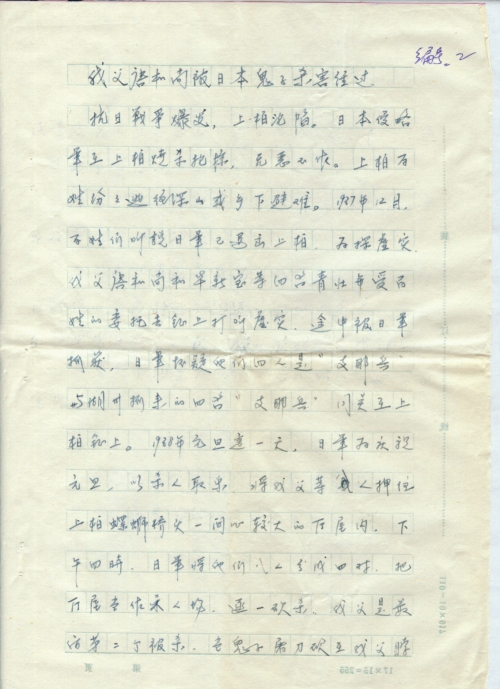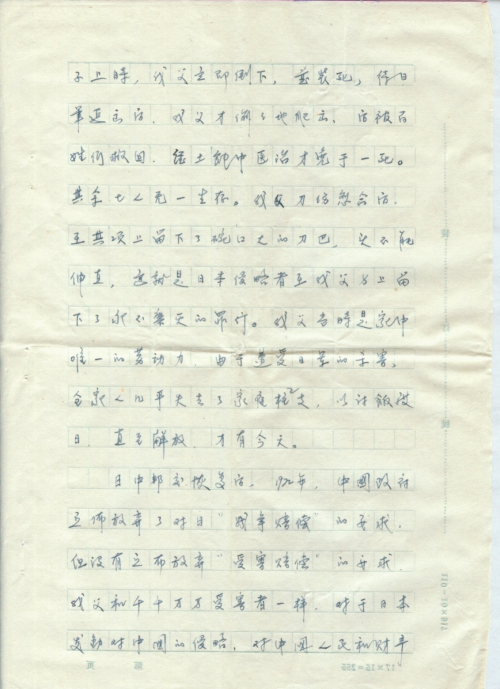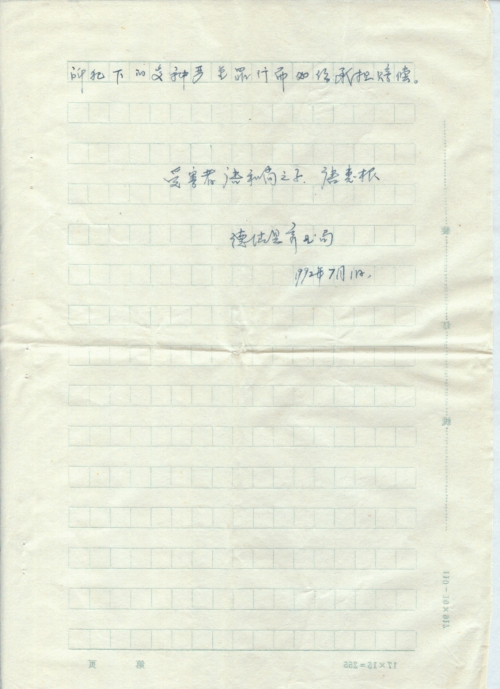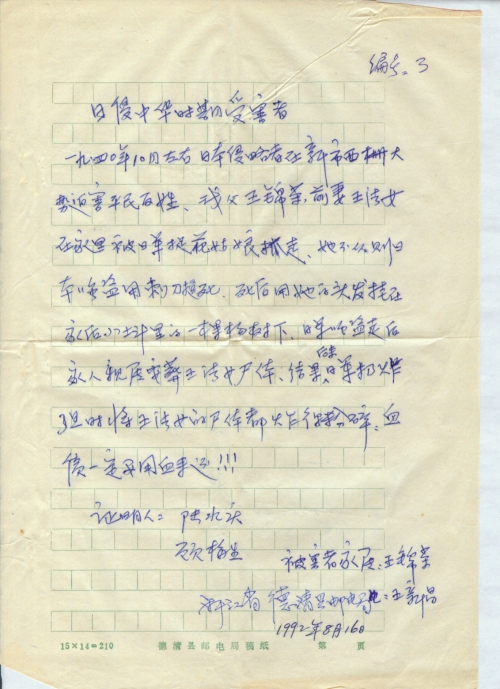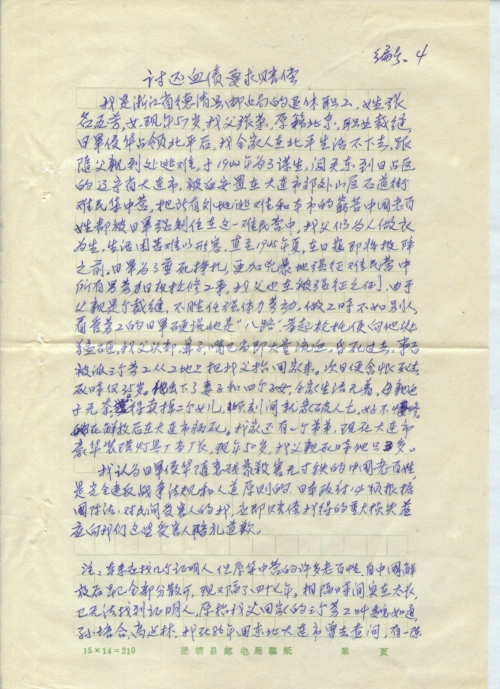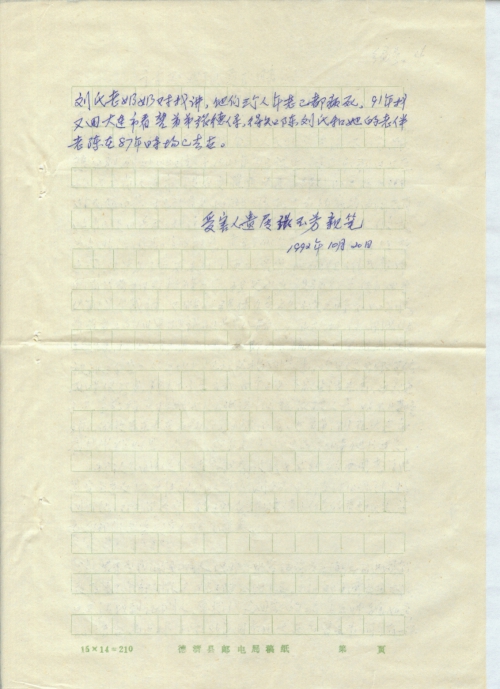Date of letter:1992-11-01
Address of author:Deqing County, Zhejiang Province
Date of event:1937, 1938, 1940, 1942, 1945
Location of event:Zhejiang Province, Anhui Province
Name of author:Xu Jiyao, Tang Huigen, Wang Jinrong
Name(s) of victim(s):Xu Jiyao, Tang Huigen, Wang Jinrong’s family
Other details:In 1937, the Japanese soldiers invaded my hometown. As an ordinary worker, Xu Jiyao’s father had no choice but to escape. He arrived at Lihuang County of Anhui Province, now renamed as Jinzhai County. In January 1942, the county was also occupied by the Japanese soldiers who pursued the policy of “burn all, kill all, loot all”. The Japanese soldiers killed everyone they saw, and killed more than a thousand people, including Wu Zhenjun, Zhou Jingshu and Xu Ji Yao’s younger brother Xu Xiaomao. Xu Jiyao’s younger brother Xu Yougen and his father Xu Nianci were caught by the Japanese soldiers. The next day, they and other dozens of people were stripped naked and tied by the road. It was winter, and they were all stabbed or frozen to death. I was stabbed, but I kept my body unmoved while bearing the pain. The Japanese soldiers thought I was dead and then left. In 1938, in order to celebrate the New Year’s Day, the Japanese soldiers caught some people including Tang Huigen’s father and killed persons for fun. His father was knifed, but he pretended to be dead and survived. Around October 1940, the Japanese soldiers were in Xinshi. My father Wang Jin Rong’s ex-wife was caught by the Japanese soldiers. She was unwilling to yield to the insult and beheaded, with her head hanged in the trees. In 1945, the Japanese soldiers conducted desperate struggles before they surrendered. They forced people to do hard labor. Zhang Yufang’s father was caught and killed.
Comrade Tong Zeng:
I am sending you 4 written materials about 4 victims Xu Jiyao, Tang Huigen, Wang Xinchang and Zhang Yufang to help you further understand the atrocities of the Japanese army and the suffering of Chinese people during Japan’s war of aggression against China. We have the right to strongly demand the Japanese to publicly apologize to and compensate us for all our losses. Please do your best to help us, thank you.
Best regards,
Xu Jiyao
November 1, 1992
No. 53, Zhaojia Avenue, Deqing, Zhejiang
Phone: 24528
Postal code: 313200
No. 1
Unforgettable Blood Debt
I am Xu Jiyao, male, 69, a retired employee from the Post Office of Deqing, Zhejiang and now live at No. 53, Zhaojia Avenue, Deqing, Zhejiang.
My family was poor victims of Japan’s war of aggression against China during the World War II. The Japanese army owes us a big blood debt for taking 3 lives and seriously injuring 1.
The Japanese army conducted bloody atrocities during the long period of invading China. I feel scared whenever recalling how my family was killed by the Japanese army on the way of fleeing. These memories are just like the scars still on my body. They make me suffer from dizziness and blurred vision. And cause my emotions to go up and down. How could I ever forget what happened!
In 1937, Japanese imperialists launched the war of aggression against China to swallow up China. In the early stage, the well-prepared Japanese Armed Forces heavily attacked and bombed our land by sea, land and air, forcing millions of innocent Chinese people to suffer and to leave their hometown and flee for life. My father Xu Nianci was then an ordinary employee with the Telecommunications Office of Yixing, Jiangsu. With the Japanese coming, he unwillingly had to take all the family to join the fugitive group. We began to live an inhuman life. I was then a 14-year-old young man who often suffered from diseases.
In 1939, after suffering a lot, my whole family came to Lihuang (now Jinzhai), Anhui at the junction of Hubei, Henan and Anhui provinces, also known as Dabie mountain base areas behind the enemy lines. My father found a job at the Business Department of the local Telecommunications Office. My whole family hoped to live safely in the mountain area. Unexpectedly, the crazy Japanese army secretly raided Lihuang from Tengjiabao, Hubei in Late December 1941 and occupied it on lunar January 2, 1942 to implement its program of raiding the Chiang’s 10th Commander. Then, the Japanese army implemented a 3-day Three Alls Policy of burning, killing and looting. There was no evil that they did not do causing great fear and countless civil death and casualties for those who were not able to escape. On lunar January 5, the Japanese savage army left Lihuang for Xinyang, Henan by passing Gushi, Henan. On lunar January 5 and 6, the Japanese army killed all fugitives they saw on the way, no matter if they were men, women, old or young. They bayonetted those who were nearby and shot those who were far away.. None of those who were fleeing was spared. Over 1,000 people were killed along the way from Yejiaji, Henan to Gushi. Corpses were all over the place; it was horrifying. In this raid, over 10 employees and their family members from the Telecommunications Office of Lihuang were also killed, including telegrapher Wu Zhenjun, accountant Zhou Jingshu and cashier Chen Shitai, etc.. My 7-member family escaped out of Lihuang the night before the arrival of the Japanese army. We were exhausted when escaping to near Shigu, Henan (not far away Lihuang). As the children were too young to walk fast, we were caught up with by the Japanese army. These inhuman beings shot my then 7-year-old weak crippled younger brother Xu Xiaomao in the head; he could not utter a sound, died on the spot and blood was all over the place. Meanwhile, I was hurt by shrapnel in the right shoulder, face and head. My shoulder was sheared open exposing the bones. My face and temple were hit by shrapnel and I fell down in blood. My father Xu Nianci and 17-year-old younger brother Xu Yougen were captured. The next day, they were taken to the roadside together with other dozens of civilians. The Japanese army forced them to take off their clothes and bayoneted and froze them to death in cold winter. My father was bayoneted 7 times. He was hurt at multiple sites in his body and writhed on the ground in blood and mud before dying. My younger brother worse. He was chaotically bayonetted many times and there was a hole in his chest. It was unbearable to watch. After I fell down on the ground, I could hear the Japanese soldiers shouting and see three armed soldiers running at me. I was seriously injured and could not breathe. But I gritted my teeth to remain still. My face was covered in blood and everything was a blur. My clothes were soaked in blood and they thought I was dead and left. At dusk, I had no strength and was dizzy. Twice I tried hard to stand up and after struggling, I managed to walk to a farmer’s house. But then I blacked out because I lost a lot of blood. The savages left after clearing the area but I still had a fever and was in a coma. Luckily, the farmer sent a doctor to treat me and took out the shrapnel from my head and I survived. But because of the lack of medicines, the crude treatments lead to infections in my wounds and I was in grave danger. My older brother who was not yet 20 years old, tried his best to save me, so my life was saved. The worst part was the savage Japanese army burned all employee houses of the Telecommunications Office, Lihuang, including my family’s self-built 3 thatched cottages and all property in them.
Only 4 out of 7 family members survived the disaster, and I was permanently disabled. My father was the primary breadwinner. You could image how difficult our life became after his death. My step-mother Wang Shuhua was forced to remarry. She is 76 now and lives in the dormitory of No. 1 Transport Company on Fangzhi Road, Anqing, Anhui. My younger brother Xu Xiaoping had his name changed to Ren Jingdao when my step-mother remarried by taking him with her. He is now 51 and works with the Logistics Department, Administration Division, Machinery Plant, Nonferrous Metals Company, Tongling, Anhui. My younger sister Xu Jizhen is 54 and works as a doctor of the Infirmary, Yan’an Hotel, Hangzhou, Zhejiang.
The following living witnesses can prove my family’s suffering:
Zhang Wenbao, a retired employee from the Post Office of Hefei, Anhui, now lives in the dormitory of the Post Office of Hefei. He was once a telegrapher of the Telecommunications Office of Lihuang. Zhu Yunsheng, a retired cadre from the Post Office of Wuhu, Anhui, now lives in the dormitory of the Post Office of Wuhu. He was once a telegrapher of the Telecommunications Office of Lihuang.
The Japanese militarists’ horrible crimes were condemned by all countries. Finally, Japanese Emperor Hirohito announced unconditional surrender on August 15, 1945.
The Chinese army finally won the anti-Japanese war through 8-year brave fight under the wise leadership of the Communist Party of China. China won the war at the cost of millions of people’s blood and lives. It was not easy.
But the Japanese government still neglects its horrible crimes to the Chinese people. The invading Japanese army massively killed unarmed Chinese people including disabled children, babies and pregnant women by completely violating the laws of war and humanitarian principles.
I and my family who suffered a lot have the right to strongly demand the Japanese government to compensate for all our losses.
To realize a true friendship between the Chinese and Japanese peoples, the Japanese government must quickly make proper compensation and a formal apology to Chinese victims.
The blood debt that the Japanese army owes us must be repaid thoroughly.
Victim and victims’ family member: Xu Jiyao (Personal seal)
August 15, 1992
No. 2
The Process of My Father Tang Heshang Being Killed by the Japanese Army
The Anti-Japanese war broke out and Shangbo fell. The invading Japanese army burned, killed and looted in Shangbo. There was no evil they did not commit. The local people escaped to the mountains or countryside. In December 1937, the local people heard that the Japanese army had left Shangbo. To find out whether it’s true, 4 young men including my father Tang Heshang and another man Hua Xinbao went to the town to find out under the entrustment of the local people. Unfortunately, they were captured by the Japanese army on the way. The Japanese army suspected they were Chinese soldiers, so they held them in Shangbo Town with another four Chinese soldiers captured from Huzhou. On January 1, 1938, the Japanese army decided to kill for celebration. They escorted the eight men including my father to a large room at Luosi Bridge, Shangbo, divided them into 4 groups at 4 pm and killed them one by one. My father was the second to the last to be killed. When Japanese soldiers bayoneted my father in his neck, my father immediately fell down and played dead. After the Japanese soldiers left, my father quietly climbed out of the room, sought treatment by a local doctor and survived. The other 7 men were dead. A long scar has remained on my father’s neck after his wound was healed and my father can’t straighten up his head. The Japanese invaders’ horrible crimes left a lifelong scar on my father. My father was the family’s only breadwinner. Due to his injury by the Japanese army, the whole family almost lost income and had to beg for life until the People’s Liberation.
After Japan and China restored diplomatic relations, the Chinese government announced to give up war reparations against Japan in 1972, but didn’t give up the claim for damage compensation. My father was like thousands and tens of thousands of other victims. The Japanese army committed horrible crimes such as taking Chinese people’s lives and properties during Japan’s war of aggression against China. Japan must compensate the victims.
Victim Tang Heshang’s son: Tang Huigen
Business Bureau, Deqing County
July 1, 1992
No. 3
Victim of Japan’s War of Aggression Against China
In about October 1940, the Japanese invaders massively victimized civilians in Xizha, Xinshi. My father Wang Jinrong’s ex-wife Wang Qingnv was captured away and was bayoneted to death for refusing to be raped. After killing her, the Japanese soldiers hung her on a poplar tree behind the house using her hair. The family buried her dead body after the Japanese soldiers left. But later, her corpse was blown to pieces by Japanese bombs. The blood debt must be repaid with blood!
Witness: Lu Shuiqing
Gu Meisheng
Victim’s family member: Wang Jinrong
Wang Xinchang, Post Office, Deqing, Zhejiang
August 16, 1992
No. 4
Demanding Compensation for a Blood Debt
I am Zhang Yufang, female, 57, a retired employee from the Post Office, Deqing, Zhejiang. My father Zhang Rong was born in Beijing and was a professional tailor. After the Japanese army occupied Beiping, we could not live there anymore and my father took the whole family to flee away. In 1942, to make a living, we came to Dalian, Liaoning occupied by the Japanese army and were forced to live in the refugee camp on Shidao Street in the suburb of Dalian. The Japanese army forced all refugees and local poor people to live in the concentration camp. My father still made clothes for others; our life was indescribably hard until the summer of 1945 right before Japan’s surrender. Because they tried to struggle before their defeat, the Japanese army more cruelly took away men to do construction work day and night. My father was among them. My father was a tailor and incompetent at intense physical work. The Japanese soldier supervising the laborers claimed him a Chinese soldier and brutally beat him in the head and face with the butt of gun. My father bled heavily from his head, nose and mouth and blacked out on the spot. Later, three laborers carried my father home. He died with hate the next day at the age of 35. So, there was just my mother and four children with no means of making a living. My mother had to sell two daughters to make a living. My family was torn apart like that. How tragic! My mother died of illness in Dalian after the People’s Liberation. My younger brother is 50, the head of a luxury decoration lamp factory in Dalian. He was only 3 when my father died.
I think the invading Japanese army brutally killing unarmed Chinese civilians at will is in complete violation of the laws of war and humanitarian principles, so the Japanese government must apologize to and compensate victims like me in accordance with international laws.
Note: I should find some witnesses, but I cannot because the people who lived in the camp got separated after the People’s Liberation and it’s been as long as 47 years. The time is so long so I cannot find witnesses. But I know the three laborers who carried my father home were Wei Rutong, Sun Peihe and Gao Jianlin. I tried to find them in 1986 when I returned to Dalian, but a Mrs. Chen née Liu told me they all died of illness. When I returned to Dalian again in 1991 to visit my younger brother Zhang Debao, I learned that the Mrs. Chen née Liu and her husband Mr. Chen both passed away in 1987.
Victim’s family member: Zhang Yufang
October 20, 1992














